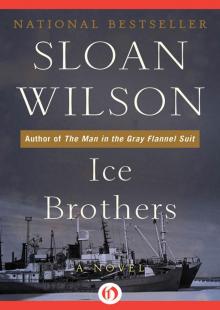- Home
- Sloan Wilson
A Summer Place Page 10
A Summer Place Read online
Page 10
“Good morning,” Ken said in his deep voice. His hair was still wet, she saw, and the cuffs of his trousers were muddy.
“Good morning.”
“Sylvia dear,” Mrs. Hamble said, “this isn’t a good way for me to start the day, but I must tell you there’s a leak in the roof.”
“Where, Mrs. Hamble?”
“In my bathroom.”
“Where in the bathroom?”
“It’s odd,” Mrs. Hamble said, “but it’s right over one of the conveniences. It is causing no damage, but I thought you ought to know.”
“That’s funny; we have another one like that,” Sylvia said. There seemed to be something eerie about such incidents, almost as though Bart were right about the Lord taking care of His own helpless people in curious ways.
“I do hope you’ll call someone to fix it,” Mrs. Hamble said. “I must admit it causes some difficulty.”
Helen Jorgenson laughed, a high nervous twitter, and a few of the others joined in.
“I’ll see about it,” Sylvia replied, and put her hand up to her forehead, stroking it back across her hair, the way she always did when she was confused. It was very hard, as well as expensive, to get repairmen to come from the mainland.
“Would you like me to look at it?” Ken asked, his deep voice filling the room.
“Do you know about roofs?” Sylvia asked in surprise.
“A little.”
“I’d be grateful,” Sylvia said.
First they inspected the two leaks, one over the toilet in Mrs. Hamble’s bathroom, and one over the bathtub on the third floor. With a flashlight Sylvia showed Ken up the narrow attic stairs, and he poked around the eaves for ten minutes. Then he opened a trap door and emerged onto the wet tiles, crawling over the roof on his stomach, examining every inch. When he came down, he was dripping wet and grinning.
“Nothing to worry about,” he said. “They ran ventilator pipes into your new bathrooms, and the flashing was poorly put on.”
“Will it cost much to fix?”
“If you’ve got tools, I can do it.”
“Oh, you don’t want to take the time!”
“I like to keep busy.”
She screwed up her courage and said, “Is the roof itself all right?”
“My God, it’s slate. It will last a thousand years.”
“Thanks,” Sylvia said. “I can’t tell you how worried we were about it!”
“Do you have the tools?”
“You’re sure you want to bother with it?”
He grinned again. “I get restless,” he said. “I was never born to be a gentleman of leisure.”
Looking resentful, Todd Hasper lent Ken his tool chest. As soon as the rain stopped, Ken clambered to the roof again and sat there working with a blazing blowtorch and a soldering iron. To Sylvia’s astonishment, he next began to plane a porch door that long had jammed, and to replace some torn screens.
Sometimes Sylvia sat and watched him work, although she too tried to keep as busy as possible that week. Ken talked lightly about the month he had been a carpenter’s helper while a student at college. There was of course no mention of that other job he had had, the one on Pine Island he had quit. He just said he had been a carpenter’s helper for a few weeks toward the end of one summer, when he happened to need some money, and that’s how he learned to handle tools. Watching him with his big hands moving quickly on the door he was planing, Sylvia felt less tension than when they sat talking at the dinner table, for usually he kept his eyes on his work. It was his eyes that robbed her of her poise, the deep-set, brooding eyes, the smoldering tormented look which hadn’t changed in so many years.
To get away from those eyes and from Mrs. Hamble’s bright, inquiring stare, Sylvia began taking long walks by herself for the first time in many years, knowing it was all right for her to stay out of sight so long as Ken remained at the inn, within full sight of the gossips. Often starting immediately after breakfast, she hiked clear to the south end of the island, where the granite hills frayed out in a tangle of surf, boulders and sand. Once she met John and Molly on the beach, walking with their thin backs bent into the wind, looking oddly like an elderly couple. The gulls wheeled about their shoulders, and the crash of the surf drowned out her words when she called to them. Smiling, Sylvia let them go.
Tiring of the beach, she climbed mountains, where she had never been before. A narrow trail led along the brink of the cliffs up one hump, which was about three hundred feet high, and into a ravine, on the steep rocky sides of which cedars and white birch grew, clinging to crevices in the rock, stunted but enduring. A trail of fallen hickories and pines marked the path of a small avalanche during the past rainstorm. Goaded by an urge for discovery, Sylvia picked her way carefully to the depths of the ravine, where gray stones at the bottom of a dry brook turned white in the August sun.
It was almost dark when Sylvia returned to the inn. Ken met her on the veranda, and she could tell from the look in his eyes that he knew she was avoiding him and that he was hurt; she also recognized that perhaps this was what she had been trying to do. There was still the echo of the instinct to hurt him. Stepping directly in front of her, he said, “Sylvia, could I talk to you for a minute?”
Her head jerked up. “What about?” she asked.
“It’s kind of important, to me anyway. Let’s go out in the garden.”
She looked around the porch, but it was dinnertime, and no one was in sight, not even Mrs. Hamble. “All right,” she said, and followed him as he led the way across the lawn toward the old fountain. Fireflies throbbed in the dusk, and she remembered how at some party long ago everyone had pursued them with Mason jars to see how much light a large collection of them would make. She could remember the young boys in their white flannel trousers and blue blazers dashing among the lilac bushes, and the girls in their swirling pastel dresses, but she couldn’t recall whether Ken had been there, or whether he had been alone in his room. “Do you remember when…” she began, and stopped, wishing she hadn’t spoken.
“What?” he asked.
“We used to chase fireflies here.”
“I remember,” he said. “Bart bet me a dollar he could catch enough to read by.”
“Who won?”
“I did.”
In the silence that followed, the tree frogs croaked, and the katydids rasped their wings. Far away in the woods, a whippoorwill called shrilly. As they entered the rose garden, the trailing branches of one of the bushes reached out and snagged her dress. He helped her disengage it, and they continued to walk without talking. In the center of the lawn was a small circular pool with a marble Cupid who once had spouted water from his pursed lips, but now the statue looked simply as though it were kissing air, and the water beneath it lay stagnant and mottled with green scum. Although a cool wind blew from the sea, Ken began to sweat, and his sports shirt was soon plastered to his chest. Delicacy had never been his strong point, she remembered without contempt. “You said you wanted to talk to me about something,” Sylvia started to say, but did not. With his silence and his lack of ease he had already started to say it. Sylvia looked up and in the last rays of the sun was shocked to see that the leaves on the big maple tree by the north corner of the house were already beginning to turn a pale yellow. Fall was coming, all right. She shivered. Far away, down near the beach, she could hear the children shouting, and then there was no sound but the wind in the leaves.
The silence became increasingly oppressive. “I was wondering,” Ken blurted out suddenly, his deep voice sounding unnatural, “if we could come back next year and spend the whole summer.”
“Why do you want to?” She made it sound like a simple inquiry, without overtones.
He wheeled and looked down at her. “Why do you stay?” he asked.
“Because I’m married to it.” Her voice was flat.
“The winters must be hard,” he said. “I wish I could help.”
/> “Of course they’re hard!” she said with a catch in her voice, and in a sudden burst of words, she started to tell him about it. The memories of the last two winters, which had been bottled up, too horrible to admit, even to herself, came out in a rush of confidence. She told of the oppressive loneliness. She told how her children had grown pinched and thin, how her daughter, Carla, had got bronchitis with a temperature of 104, and how it had taken two days to get a doctor. She told of her fear that Todd Hasper, the morose superintendent, was really insane, that he had started muttering to himself when going about his work, that he never spoke to her now without rage in his eyes, apparently because his winter solitude had been violated, and that he had begun to tell dark stories to the children, stories which she at first had thought they had dreamed, but which they attributed to Todd Hasper when they came running to her in terror late at night.
“What kind of stories?” Ken asked.
Sylvia brushed her face with her hand. “He told them about his brother who hung himself with a piece of wire,” she said. “I found out that really happened—they didn’t dream it. He told them about it last winter, over and over again.”
“You ought to get rid of him,” Ken said.
“There has to be somebody here—and oh, he’s been here for so many years. It’s not easy to get someone to work on the island.” Sylvia went on then, her last reserve collapsing, and told about Bart’s drinking, his cycles of accusation and apology, his gloom, his violent temper when aroused, about the time when deep in his cups he had accused her of being a whore at heart, a phrase he had repeated over and over, a whore at heart, a whore at heart, and Johnny at the age of twelve had heard it and had attacked his father, a small boy with his little fists doubled up and flailing. Bart had shoved him up against the wall, banged him down on the floor, and then had stood over him crying, and had ended by throwing himself down and embracing him there on the floor, the two of them lying together and sobbing.
Sylvia paused in confusion, silently crying, with both hands covering her face. “I deserved it,” she said. “They didn’t.”
“You ought to get out of here,” Ken said, his deep voice sounding to her almost like thunder.
“How?”
“Something could be arranged.”
“What?” Her voice was tragic.
“Go back to Boston in the winter. Or Florida.”
“We can’t afford it!”
“Can’t he get a job?”
“He won’t try.”
“You could.”
“With the children?”
“Yes.”
“Like what?” Her strength was coming back now, and she sounded bitter.
“Lots of Maine people run hotels in Florida in the winter.”
“You want me to buy one with our savings? A big hotel in Miami?” Her tone was ironic.
“No. A small motel maybe.”
“For God’s sake,” she said. “Don’t you understand that we’re broke?”
“I have money. I’ll lend it to you.” There was a brief silence.
“You could take Bart too,” he added heavily. “I’ll pay him a salary.”
“No,” she said, her voice barely audible. “Your pride still comes first.”
Her breath came rushing out then between clenched teeth, and there were her hissed, agonized words, “Oh Jesus!” She crouched with her hands clenched tight to her belly, as though she had been stabbed. Suddenly he was towering over her. She felt herself crushed to him, and she flung both arms around his neck as though he were saving her from going over a waterfall. Without kissing her he said in her ear in a strange choked voice, almost a sob, a cry of despair, the one word: “Love?”
“Yes!” she replied, and then there was the sound of laughter, high and clear, and children’s voices coming closer. In panic they sprang apart, just as John and Molly and Carla burst into the garden, carrying flashlights. Ken melted into the underbrush. Without seeing him, the children ran to the pool and knelt before it, shining the lights into its dark waters. “This is the place!” Carla said exuberantly. “There always used to be lots of them here!”
“Did you ever catch any?” Molly asked.
“No,” John said. “We weren’t supposed to. But some of them were enormous.”
“Hello, kids,” Sylvia said. “What are you looking for?”
They both glanced up, startled. “Goldfish!” they said almost in unison.
“I’m afraid they all died last winter,” Sylvia replied. “We forgot to take them in, and the pool froze solid.”
“The poor things!” Molly said, her alert face suddenly clouded with grief, her mind possessed by the image of a clear cake of ice containing a neat pattern of goldfish.
“There’s something down there!” John said, stabbing the water with the beam of his light. “I just saw it move.” Suddenly he darted his hand into the murky water and came up with a frog, its bulging eyes glowing brightly. He held it in front of him and shone his light on it. Molly bent over it, her face full of wonder. “Don’t squeeze him!” she said.
Sylvia admired the frog, then turned and walked haltingly up the path. Ken silently rejoined her on the other side of the lilac bushes. He kissed her and she clung to him hard before breaking away. “Ken, Ken!” she whispered, “I don’t want to wreck everybody.”
“No.”
“They’ll be wondering where we are, even now. Meet me here at three in the morning. It’s the only time on this whole damn island we can be sure of not being missed.”
“All right,” he said, and was suddenly gone, the shadows of the lilacs swallowing him as though he had never existed.
Chapter Nine
THAT NIGHT Sylvia lay sleepless beside her husband, and tried to think rationally.
There are only four possibilities, she thought; the whole situation is perfectly clear-cut. Remaining a faithful wife, I can cut this thing off with Ken before it starts, and put the winters through on the island somehow, but I cannot do that and nothing could be worse than things are for the children.
Or I can take Ken’s money and give him nothing but interest of four per cent, but there’s a kind of immorality about that too. My pride would not allow it, and anyway, it’s not the way it would work out. The money would keep us tangled together. We are not the sort of people to manage a small platonic affair.
Or we could each get a divorce, and then we could marry, she thought. It was this possibility that her mind hovered longest over. But of course it wouldn’t work. Bart’s pride would be hurt, and Bart with hurt pride was like a small wounded lion. Perhaps he would insist on keeping the children, and that would be impossible.
Or she and Ken could have an affair, as civilized as possible, and as discreet as possible, but only an affair, with false names signed in hotel registers, probably, excuses to be given, lying explanations of absence and constant subterfuge. I never thought of myself as a particularly decent person, Sylvia thought. But an affair is not what I want now. I am too old for that, it’s not what I want at all! It is too ugly.
Or we could do what most people would probably do, she thought; we could drift along, making no real decisions, being both unchaste and unfulfilled. We can have an affair without planning it, the quick clinch in the night. We can have the gossip, the recriminations. We do not have to choose our mess—it is easier to drift into it.
No, she thought. That I won’t do, and Ken is too much of a man for that. If I’m going to have an affair, it’s going to be a good one, deliberately planned to last a lifetime and to hurt other people as little as possible. I do not want to go blundering around in the night.
But divorce and remarriage—her mind kept returning to that. It ought to be possible, she thought, for four civilized adults to sit down and work out an intelligent solution to a problem. She imagined herself and Bart and Ken and Helen sitting ceremoniously around a bridge table, and she imagined herself prattling in a high bridg
e-table voice, “The problem is that when I was young I was a fool, and now I am no longer, and I would like to marry a man I’ve always loved. Does anyone mind?”
“Why, of course not!” she imagined Bart replying. “It’s perfectly all right.”
“I pass,” Helen would say, but of course the whole thing was a travesty. What could she really say to Bart, how could she put it in a letter, the truth with no holds barred?
“Dear Bart,” she imagined herself writing, burlesquing the classic note to be pinned to a pillow, “The truth is I never loved you, I was confused. I loved what I thought you stood for, or something. I was addled by my parents and I don’t know what, but now, you see, we have to face the truth, and the truth is, dear Bart, that you are becoming an alcoholic and a little insane. I hope you don’t mind my saying this, but we have to be frank, you know. So I would like to leave you and I would like to take the children and I want to be kind if I can, although I realize that this note is not exactly tactful, but don’t be hurt.”
In the bed beside her Bart stirred restlessly in his sleep. Dim moonlight from the window illuminated his face, fine-boned and angular, and she thought, Poor Bart, God help him. God help us all, I do not like to do this.
Divorce, she thought stonily. I don’t even know whether Ken wants one. He would lose his daughter, and it’s perfectly obvious that they love each other, those two; I’ve never seen a man’s face light up so at the sight of his child. They’re always sitting together and talking together. That is a beautiful thing that I would be smashing. And it’s strange, that young girl looks at me with those great alarmed eyes as though she knew her enemy on sight.

 A Summer Place
A Summer Place Pacific Interlude
Pacific Interlude Man in the Gray Flannel Suit
Man in the Gray Flannel Suit Ice Brothers
Ice Brothers